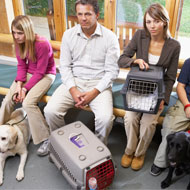Defining and building a loyal client base

Our clients do not actually shop around as much as we may think.
There are many definitions of loyalty, but business consultant Nick Steele, speaking at the SPVS/VMG conference, defined it as, 'A profitable, valuable relationship that will withstand change'.
He pointed out that a loyal, existing client has more value than a new one because they are tolerant, usually not focussed on price, they help to recruit new clients by being advocates and often spend more. It is also true to say that our clients do not actually shop around as much as we may think and that once loyal they tend to stick with us.
It is possible to measure a client's loyalty by looking at their time with the practice, how active they are, their frequency of visits, average transaction value, if their pets are vaccinated and what their status is with flea treatment.
Nick took us through the classic client journey from initial contact with the practice website to the end of the first visit and emphasised how important that first journey is in terms of retaining the client. He pointed out the need for protocols for such things as reminders, social media analytics and client KPIs.
Improving loyalty first involves assessing your own definition of loyalty and how you measure it. You should then look at what changes you need to make, implement them and measure the results.
Nick talked delegates through various loyalty strategies which could be implemented. Giving rewards is one strategy that can be employed where reward cards, discounts and loyalty rewards can all help to increase sales as well as allowing cross-selling and up-selling.
Bundling is another strategy where products for sale can be combined. This is good for increasing the uptake of new products and services and also helps compliance. But beware of too much discounting - do the sums first, said Nick.
A third strategy is that of the continuous relationship where communication with the client is continually maintained. This may be by social media, SMS, emailing and/or your website. The client will value this and footfall has been shown to increase using this strategy.
Consider also a strategy of 'anticipation' – what new services can you provide for clients and what new unique selling points you can create, such as building new services around pet life stages or adopting new forms of technology. This will help manage client expectations of the practice.
A strategy of customisation whereby you tailor services specifically to the individual e.g., personalised communication or whole life pet plans can be very effective. But these are services you must get absolutely right all the time if you are not to disappoint the client.
Finally, Nick talked about the strategy of creating client communities and networks, for example, groups of clients who have animals with specific problems. Doing this allows the sharing of experiences and the ability to ask questions of the practice. However such communities need to be monitored very regularly and thus require a serious time input from the practice.



 The RCVS has announced a new version of its 1CPD mobile app, with enhanced features for veterinary surgeons and veterinary nurses to record their continuing professional development.
The RCVS has announced a new version of its 1CPD mobile app, with enhanced features for veterinary surgeons and veterinary nurses to record their continuing professional development.